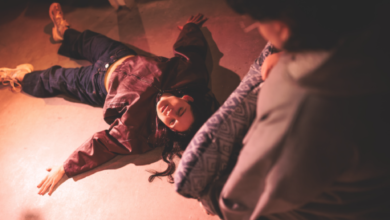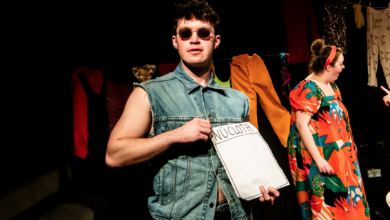Jealousy, The Print Room

Pros: A fascinating and beautifully precise production, something a bit different, clear and defined narrative that even we could follow.
Cons: No complaints, but obviously it is not a theatre-goers normal choice! Absolutely worth going to if you fancy challenging yourself and broadening your horizons - we genuinely enjoyed it and we know nothing about dance or sculpture.
summary
Rating
Excellent
As someone who is more used to attending comedies and tragedies than ballet recitals and art galleries, I must admit that I was a little apprehensive at the prospect of seeing this show. Jealousy touts itself as being ‘a collaboration between dance and sculpture’, which is hardly the area of expertise for this blog. Nonetheless, we decided to check this show out, if nothing else to discover exactly what a fusion between dance and sculpture actually entails. So, with our minds open and preconceptions put aside, we headed down to The Print Room, a remarkable little space in Notting Hill and undoubtedly a rising star in the world of fringe venues.
We were right to keep an open mind. The show was an incredibly interesting and often moving installation, and above all it was executed, designed, and choreographed with surgical precision. The concept of the production originates from visual artist Laurence Kavanagh. He has adapted the 1957 novel of the same name, Jealousy, which follows the dark thoughts of a husband who convinces himself that his wife is cheating on him. The novel was acclaimed for its remarkable structure, which does away with a conventional plotline and places the reader in the driving seat. Kavanagh has transposed this into an installation using a series of devices: the set, the sound, the lights, and of course, with his collaborators, the choreography.
The installation is placed in the round, and the set – the sculpture part of the collaboration – is formed by suspended railings, door frames and windowsills. Nothing, save a few perspectivised chairs, touches the floor. To accentuate this remarkable design, the stage is beautifully lit, almost exclusively by spots in a lighting design conceived by Charlie Lucas. And to top it off, an incredible soundtrack (to which the choreography and lighting is impeccably timed) has been composed by Neil Alexander, who has sound designed for the National Theatre, no less! This collage of buzzing, sound bytes, and samples is reminiscent of some of the best post-rock we’ve heard and comes together as both a motor for the action and a soundscape of the husband’s mindset.
Perhaps the best thing about this production is the fact that there is a clear and definite narrative, which is conveyed by the dancers’ performances, and the choreographers’ talent. As I mentioned above, I am no expert in the realms of dance, but I was very impressed by the seamless flow of the dancers’ pieces. Some very interesting devices were used by the choreographers also, such as having spaces within the set mirrored by matching routines and identical costumes. The idea is to convey the husband’s erratic paranoia, and it is very effective, and visually stunning. Perhaps the standout routine was that of the final seduction of the wife, in which an incredibly intricate duet is performed without the woman dancer even once touching the ground. Not once.
All in all, this is not a performance which would be a natural choice for traditional theatre-goers. However, if you fancy a change and are willing to try something new, then make a detour for this fascinating piece.
Based on the novel by: Alain Robbe-Grillet
Conceived by: Laurence Kavanagh
Choreographers: James Cousins, Hubert Essakow, Dani Hay Gordon and Morgann Runacre-Temple
Box Office: 020 7221 6036
Booking Link: www.the-print-room.org
Booking Until: 18th February 2012





